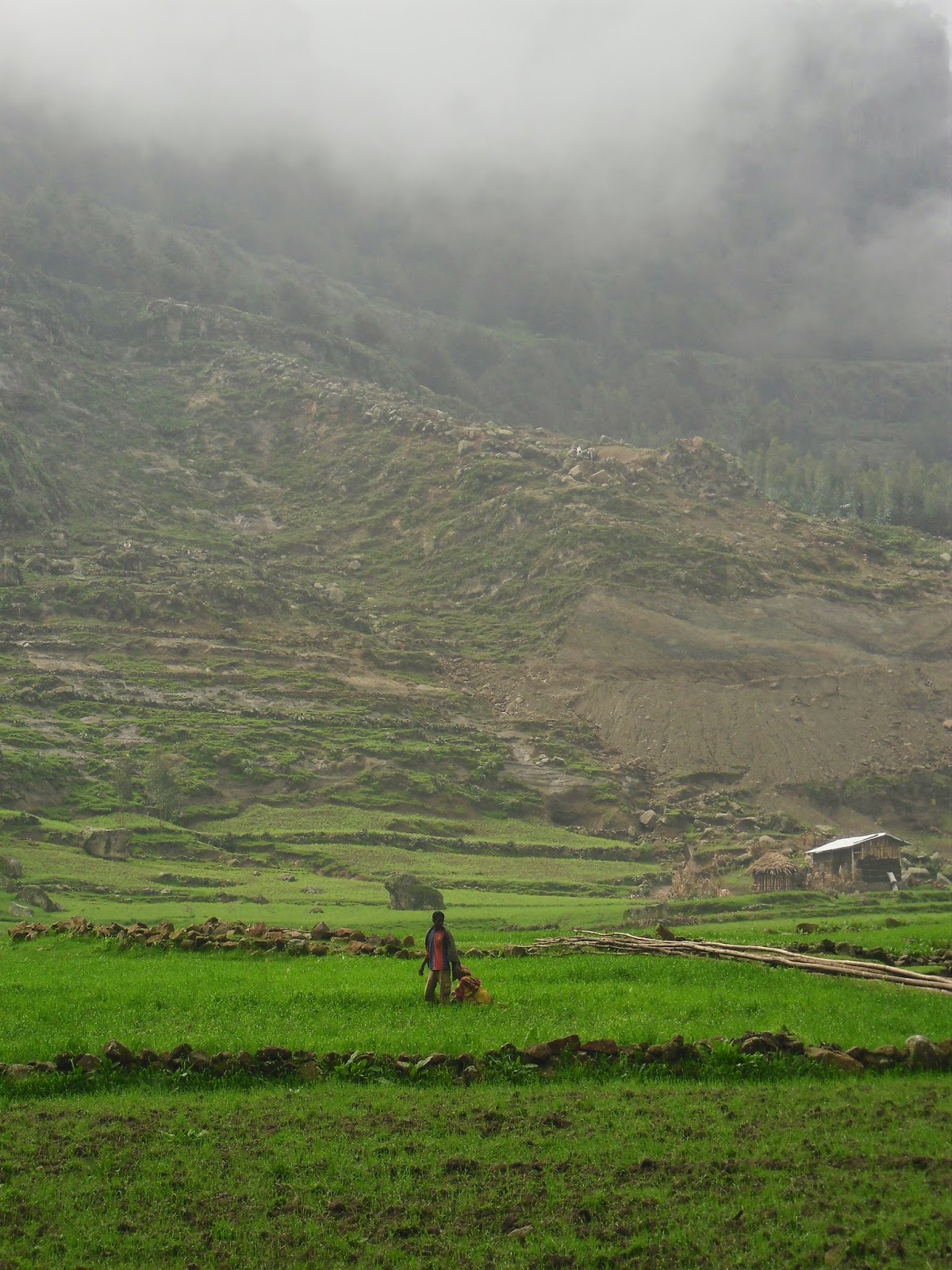Paul Farmer: Lessons from the Mountains (Part 1)
Paul Farmer. A name I had heard while overseas in Addis Ababa, Ethiopia. It was the summer of 2013, and I was busy wrapping up an eight-week public health research study among college students in the country. My research colleague, stunned that I had never heard of such an iconic figure, informed me that Dr. Farmer had done substantial work in global health delivery in Haiti and other countries around the world, as well as pioneered an organization called Partners in Health. Upon returning to the States, slightly embarrassed by my apparent ignorance of such a legend, I did a quick Google search on Farmer, finding the same summary of information disclosed by my colleague. After sifting through a few more websites, I came across the book Mountains Beyond Mountains by Tracy Kidder, a biography written about Farmer and his life's work. I decided to purchase the book.
I did not pick up the book right away. For months, it waited. Waited patiently as "unread" on my Kindle. Then, in March, I received an email with the heading Welcome to Harvard Medical School! After a year of applications, interviews, and agonizing rounds of the "waiting game," I was committed to Harvard Med. Excited about the upcoming school year and perusing through Harvard Medical School first-year curriculum notes, I came across a course entitled "Social Medicine" taught by none other than...guess who...Paul Farmer. Unable to avoid this name, I decided to dust off my Kindle and delve into the pages of Mountains Beyond Mountains.
In the first few chapters of the book, the author paints the picture of Cange, one of the poorest areas of Haiti--the poorest country in the Western Hemisphere. Kidder describes the Partners in Health (PIH) establishment there, "Zanmi Lasante," and its medical complex of ambulatory and women's clinics, hospital, and laboratories. Zanmi Lasante and its community health workers service a catchment area of approximately 100,000 people and have made an already tremendous impact in the area, including the construction of schools and sanitation systems, vaccination of all children, reduction in HIV transmission rates, and provision of programs that target maternal and child health. But what strikes me most about Zanmi Lasante and Paul Farmer is not necessarily the variety of services that are offered through the complex, but more so the philosophy that permeates the medical environment and PIH staff there. When asked about his thoughts on global health projects that fail because of "noncompliant" patients that don't adhere to medication regimens, Farmer comments: "The only noncompliant people are physicians. If the patient doesn't get better, it's your own fault. Fix it."
A rising medical student, I am inspired by Dr. Farmer's dedication and commitment to his patients. It forces me to introspection--influencing the formation of my own definition of what it means to uphold the principles of "patient-centered" healthcare. Mountains, furthermore, goes into a brief explanation on Farmer's background in medical anthropology. After taking a semester of undergraduate level medical anthropology coursework at Howard University, I am familiar with Farmer's practices in the critical (or applied) medical anthropological approach--an approach which examines how health care resources are allocated based on wealth, political affiliation, and other power structural systems. Kidder cites that one of Farmer's most significant influences was Rudolf Virchow, a German anthropologist, biologist, and archaeologist with a unique perspective on the interconnectedness between medicine, politics, anthropology, and disease. Kidder cites a quote from Virchow which states, "Medicine is a social science, and politics is nothing but medicine on a larger scale." Farmer maintains an understanding that a physician is not only an agent of change in the medical field, but also has the capacity to affect change on a scale that influences our interactions with society on a daily basis. In this vein, Dr. Farmer is a proponent and advocate for the poor, utilizing his influence to shake up social dynamics and draw attention to the disparities in healthcare among the world's poor populations.
One of the stories in Mountains that illustrates Farmer's unwavering commitment to his patients and the poor population of Haiti is the account of a TB patient from Morne Michel village who had not shown up for his monthly appointment at the medical complex. Dr. Farmer saw it as HIS responsibility to locate the patient, discover why the patient missed the appointment, and ensure that the patient took the medication for TB. Kidder details her and Farmer's extensive and tiring trek through the mountains to Morne Michel,--"the most distant of all settlements in Zanmi Lasante's catchment area"--the makeshift footpaths of dirt and stone over which they traveled, and the unbelievable sights of poor Haitian men, women, and children who climbed the rocky and steep paths of the mountains on a daily basis for survival. To me, this description of unfortunate circumstances resonated with my own experiences with "Mountains" in Ethiopia.
In July 2013, my public health research team visited a number of rural areas within Ethiopia, including Bulbula and outskirt areas surrounding Lalibela. We were told that hundreds of patients often travel great lengths and extensive distances for basic health care services at one of Ethiopia's rural health posts or community health centers. Wanting to experience a trek for ourselves, we set out on a journey to a small settlement area in the Adwa Mountains of Ethiopia. As I ascended the mountain along less-than-sturdy stones that served to guide my footing and narrowly dangerous trails carved out by the poor populations that lived on the terrain, I stood incredulous at the thought that anyone--not to mention pregnant women or elderly individuals--could maneuver this obstacle on a daily basis. My own perspectives on the challenges and struggles endured by poor populations around the world were broadened, and Farmer's story of the Morne Michel TB patient reiterates this idea that similar social and power structures affect access to healthcare around the world.
Mountains provides an interesting look at one man's dedication to examining and exploring the implications of culture, poverty, politics, and other social dynamics on access to health care in one of the world's poorest nations. Farmer teaches us the lesson that medicine and society are not separate entities but are intertwined and integrated in a complex fashion, one constantly influencing the other.
To learn more about Farmer's work with the poor in Haiti and the Partners in Health organization's approach to building healthcare systems, check out the following conversation with Paul Farmer at the University of California San Diego.
A rising medical student, I am inspired by Dr. Farmer's dedication and commitment to his patients. It forces me to introspection--influencing the formation of my own definition of what it means to uphold the principles of "patient-centered" healthcare. Mountains, furthermore, goes into a brief explanation on Farmer's background in medical anthropology. After taking a semester of undergraduate level medical anthropology coursework at Howard University, I am familiar with Farmer's practices in the critical (or applied) medical anthropological approach--an approach which examines how health care resources are allocated based on wealth, political affiliation, and other power structural systems. Kidder cites that one of Farmer's most significant influences was Rudolf Virchow, a German anthropologist, biologist, and archaeologist with a unique perspective on the interconnectedness between medicine, politics, anthropology, and disease. Kidder cites a quote from Virchow which states, "Medicine is a social science, and politics is nothing but medicine on a larger scale." Farmer maintains an understanding that a physician is not only an agent of change in the medical field, but also has the capacity to affect change on a scale that influences our interactions with society on a daily basis. In this vein, Dr. Farmer is a proponent and advocate for the poor, utilizing his influence to shake up social dynamics and draw attention to the disparities in healthcare among the world's poor populations.
One of the stories in Mountains that illustrates Farmer's unwavering commitment to his patients and the poor population of Haiti is the account of a TB patient from Morne Michel village who had not shown up for his monthly appointment at the medical complex. Dr. Farmer saw it as HIS responsibility to locate the patient, discover why the patient missed the appointment, and ensure that the patient took the medication for TB. Kidder details her and Farmer's extensive and tiring trek through the mountains to Morne Michel,--"the most distant of all settlements in Zanmi Lasante's catchment area"--the makeshift footpaths of dirt and stone over which they traveled, and the unbelievable sights of poor Haitian men, women, and children who climbed the rocky and steep paths of the mountains on a daily basis for survival. To me, this description of unfortunate circumstances resonated with my own experiences with "Mountains" in Ethiopia.
In July 2013, my public health research team visited a number of rural areas within Ethiopia, including Bulbula and outskirt areas surrounding Lalibela. We were told that hundreds of patients often travel great lengths and extensive distances for basic health care services at one of Ethiopia's rural health posts or community health centers. Wanting to experience a trek for ourselves, we set out on a journey to a small settlement area in the Adwa Mountains of Ethiopia. As I ascended the mountain along less-than-sturdy stones that served to guide my footing and narrowly dangerous trails carved out by the poor populations that lived on the terrain, I stood incredulous at the thought that anyone--not to mention pregnant women or elderly individuals--could maneuver this obstacle on a daily basis. My own perspectives on the challenges and struggles endured by poor populations around the world were broadened, and Farmer's story of the Morne Michel TB patient reiterates this idea that similar social and power structures affect access to healthcare around the world.
 |
| Ethiopian Adwa Mountains |
To learn more about Farmer's work with the poor in Haiti and the Partners in Health organization's approach to building healthcare systems, check out the following conversation with Paul Farmer at the University of California San Diego.




Comments
Post a Comment